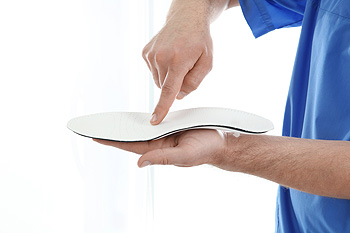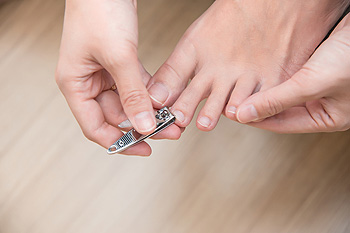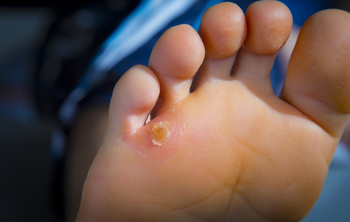Items filtered by date: September 2019
Can Foot Pain Be Related to Obesity?
Research has indicated that foot pain may increase in obese patients. This can be a result of added pressure that the plantar fascia must endure. It may lead to a painful foot condition that is known as plantar fasciitis. Additionally, patients who are overweight may suffer from heel pain, and may develop heel spurs. An effective method of losing unwanted weight is to practice a regular aerobic exercise routine. Obese people may find difficulty in maintaining a healthy weight possibly due to a lack of exercise, and this may be a result of chronic foot pain that may accompany obesity. Consult with a podiatrist about any foot pain you have from being obese as this will provide you with the best methods in losing excess weight.
The more you weigh, the harder your feet must work to support your body. If you’re an obese individual and are concerned about your feet, contact Jim Maxka, DPM from South Penn Foot & Ankle Associates. Our doctor can provide the care you need to keep you pain-free and on your feet.
Obesity and Your Feet
People who are overweight are putting more pressure on their ankles, knees, and hips as well as their feet. This unfortunately can lead to variety of different issues.
Problems & Complications Stemming from Obesity
- When the body is overweight, it tries to compensate by changing the way that it moves. An obese person may lean forward and put extra weight on the wrong part of the foot. This puts unnecessary stress on the feet.
- Obese people are also more likely to develop type II diabetes which is a condition that causes a lot of foot problems. People with diabetes often don’t feel the cuts and sores that they may have on their feet, which can lead to more complicated and severe issues.
- Plantar fasciitis is another foot condition that can be caused by obesity. Plantar fasciitis is an inflammation of the tissue along the bottom of the foot, which causes pain and stiffness while walking and climbing stairs.
If you have any questions, please feel free to contact our office located in Hanover, PA . We offer the newest diagnostic and treatment technologies for all your foot care needs.
Do Your Child's Feet Hurt?
Ease Pain with the Help of Orthotics
 Those suffering from painful conditions such as plantar fasciitis can find relief with orthotics, or shoe inserts. Orthotics can help minimize symptoms of pain and stiffness in the heel. These symptoms typically occur as a result of stress on the plantar fascia due to standing or walking. Orthotics can reduce these symptoms by contouring to the shape of the foot and providing cushion. This extra cushion absorbs excess shock experienced when walking and reduces the pressure on the heel. While standard versions are available, orthotics can also be custom-made to fit the feet for optimal results. If you have questions about orthotics and if they can work for you, consult with your podiatrist.
Those suffering from painful conditions such as plantar fasciitis can find relief with orthotics, or shoe inserts. Orthotics can help minimize symptoms of pain and stiffness in the heel. These symptoms typically occur as a result of stress on the plantar fascia due to standing or walking. Orthotics can reduce these symptoms by contouring to the shape of the foot and providing cushion. This extra cushion absorbs excess shock experienced when walking and reduces the pressure on the heel. While standard versions are available, orthotics can also be custom-made to fit the feet for optimal results. If you have questions about orthotics and if they can work for you, consult with your podiatrist.
If you are having discomfort in your feet and would like to try orthotics, contact Jim Maxka, DPM from South Penn Foot & Ankle Associates. Our doctor can provide the care you need to keep you pain-free and on your feet.
What Are Orthotics?
Orthotics are inserts you can place into your shoes to help with a variety of foot problems such as flat feet or foot pain. Orthotics provide relief and comfort for minor foot and heel pain but can’t correct serious biomechanical problems in your feet.
Over-the-Counter Inserts
Orthotics come in a wide variety of over-the-counter inserts that are used to treat foot pain, heel pain, and minor problems. For example, arch supports can be inserted into your shoes to help correct overarched or flat feet, while gel insoles are often used because they provide comfort and relief from foot and heel pain by alleviating pressure.
Prescription Orthotics
If over-the-counter inserts don’t work for you or if you have a more severe foot concern, it is possible to have your podiatrist prescribe custom orthotics. These high-quality inserts are designed to treat problems such as abnormal motion, plantar fasciitis, and severe forms of heel pain. They can even be used to help patients suffering from diabetes by treating foot ulcers and painful calluses and are usually molded to your feet individually, which allows them to provide full support and comfort.
If you are experiencing minor to severe foot or heel pain, it’s recommended to speak with your podiatrist about the possibilities of using orthotics. A podiatrist can determine which type of orthotic is right for you and allow you to take the first steps towards being pain-free.
If you have any questions please contact our office located in Hanover, PA . We offer the newest diagnostic and treatment technologies for all your foot and ankle needs.
Possible Ways To Prevent Falling
Research has indicated that approximately one third of seniors in America will fall during the night. This can cause many injuries to occur, that may include painful foot ailments. There are methods that can be implemented which can help to reduce the risk of falling. These can consist of improving the lighting in the bedroom and hallways, removing worn carpeting, and installing grab bars in the shower and toilet areas. Many seniors find it beneficial to live in a home that has one level, and this can aid in preventing hazardous falls that may be caused by stairs. Additionally, it is helpful to incorporate a gentle exercise program into your daily routine. This can result in strengthening muscles which may also help to prevent falling. Please speak with a podiatrist if you would like more information on how falling may affect the feet.
Preventing falls among the elderly is very important. If you are older and have fallen or fear that you are prone to falling, consult with Jim Maxka, DPM from South Penn Foot & Ankle Associates. Our doctor will assess your condition and provide you with quality advice and care.
Every 11 seconds, an elderly American is being treated in an emergency room for a fall related injury. Falls are the leading cause of head and hip injuries for those 65 and older. Due to decreases in strength, balance, senses, and lack of awareness, elderly persons are very susceptible to falling. Thankfully, there are a number of things older persons can do to prevent falls.
How to Prevent Falls
Some effective methods that older persons can do to prevent falls include:
- Enrolling in strength and balance exercise program to increase balance and strength
- Periodically having your sight and hearing checked
- Discuss any medications you have with a doctor to see if it increases the risk of falling
- Clearing the house of falling hazards and installing devices like grab bars and railings
- Utilizing a walker or cane
- Wearing shoes that provide good support and cushioning
- Talking to family members about falling and increasing awareness
Falling can be a traumatic and embarrassing experience for elderly persons; this can make them less willing to leave the house, and less willing to talk to someone about their fears of falling. Doing such things, however, will increase the likelihood of tripping or losing one’s balance. Knowing the causes of falling and how to prevent them is the best way to mitigate the risk of serious injury.
If you have any questions, please feel free to contact our office located in Hanover, PA . We offer the newest diagnostic and treatment technologies for all your foot care needs.
When to Purchase Shoes
 The feet are considered to be the foundation of the body, and it is important to maintain proper foot care. This includes washing and drying your feet completely, which may be beneficial in preventing athlete’s foot from developing. Foot odor may be avoided when the socks are changed daily. The overall feeling of the feet may improve when proper size shoes are worn. Research has indicated it is beneficial to purchase shoes in the afternoon, when the feet are at their largest. Additionally, it is helpful to wear high heels and flip flops for limited amounts of time because of the inadequate support these shoes typically provide. If you would like additional information about how to care for you feet, it is suggested that you schedule a consultation with a podiatrist who can provide you with the correct knowledge.
The feet are considered to be the foundation of the body, and it is important to maintain proper foot care. This includes washing and drying your feet completely, which may be beneficial in preventing athlete’s foot from developing. Foot odor may be avoided when the socks are changed daily. The overall feeling of the feet may improve when proper size shoes are worn. Research has indicated it is beneficial to purchase shoes in the afternoon, when the feet are at their largest. Additionally, it is helpful to wear high heels and flip flops for limited amounts of time because of the inadequate support these shoes typically provide. If you would like additional information about how to care for you feet, it is suggested that you schedule a consultation with a podiatrist who can provide you with the correct knowledge.
Everyday foot care is very important to prevent infection and other foot ailments. If you need your feet checked, contact Jim Maxka, DPM from South Penn Foot & Ankle Associates. Our doctor can provide the care you need to keep you pain-free and on your feet.
Everyday Foot Care
Often, people take care of their bodies, face and hair more so than they do for their feet. But the feet are a very important aspect of our bodies, and one that we should pay more attention to. Without our feet, we would not be able to perform most daily tasks.
It is best to check your feet regularly to make sure there are no new bruises or cuts that you may not have noticed before. For dry feet, moisturizer can easily be a remedy and can be applied as often as necessary to the affected areas. Wearing shoes that fit well can also help you maintain good foot health, as well as making it easier to walk and do daily activities without the stress or pain of ill-fitting shoes, high heels, or even flip flops. Wearing clean socks with closed shoes is important to ensure that sweat and bacteria do not accumulate within the shoe. Clean socks help to prevent Athlete’s foot, fungi problems, bad odors, and can absorb sweat.
If you have any questions please feel free to contact our office located in Hanover, PA . We offer the newest diagnostic and treatment technologies for all your foot and ankle needs.
What Causes Corns?
 Corns develop on the feet as a result of increased friction that comes from wearing shoes that are too tight. Additionally, they may develop from standing or walking for the majority of the day, and this may cause the toes to rub together. Corns are most likely to form on the top of the toes or on the bottom of the feet. Some patients will notice a corn on the inside of their toes, and this can form from excessive moisture from consistently wearing socks. Mild relief can be found if corn pads are worn. These can be effective in protecting the area of the foot from the part of the shoe that caused the friction. There are methods that can be implemented which may help to prevent corns from developing. These can include wearing shoes and socks that fit properly, and trimming the toenails frequently. If you are afflicted with a corn, please consult with a podiatrist who can guide you towards the proper treatment.
Corns develop on the feet as a result of increased friction that comes from wearing shoes that are too tight. Additionally, they may develop from standing or walking for the majority of the day, and this may cause the toes to rub together. Corns are most likely to form on the top of the toes or on the bottom of the feet. Some patients will notice a corn on the inside of their toes, and this can form from excessive moisture from consistently wearing socks. Mild relief can be found if corn pads are worn. These can be effective in protecting the area of the foot from the part of the shoe that caused the friction. There are methods that can be implemented which may help to prevent corns from developing. These can include wearing shoes and socks that fit properly, and trimming the toenails frequently. If you are afflicted with a corn, please consult with a podiatrist who can guide you towards the proper treatment.
If you have any concerns regarding your feet and ankles, contact Jim Maxka, DPM of South Penn Foot & Ankle Associates. Our doctor will treat your foot and ankle needs.
Corns: What Are They? and How Do You Get Rid of Them?
Corns can be described as areas of the skin that have thickened to the point of becoming painful or irritating. They are often layers and layers of the skin that have become dry and rough, and are normally smaller than calluses.
Ways to Prevent Corns
There are many ways to get rid of painful corns such as wearing:
- Well-fitting socks
- Comfortable shoes that are not tight around your foot
- Shoes that offer support
Treating Corns
Treatment of corns involves removing the dead skin that has built up in the specific area of the foot. Consult with Our doctor to determine the best treatment option for your case of corns.
If you have any questions please feel free to contact our office located in Hanover, PA . We offer the newest diagnostic and treatment technologies for all your foot and ankle needs.



 Like Us
Like Us Follow Us
Follow Us Review Us
Review Us